12+ SAMPLE Legal Affidavit
-
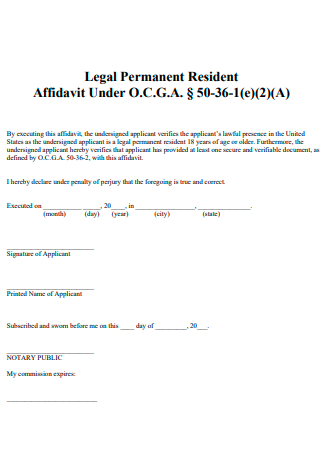
Legal Permanent Resident Affidavit
download now -
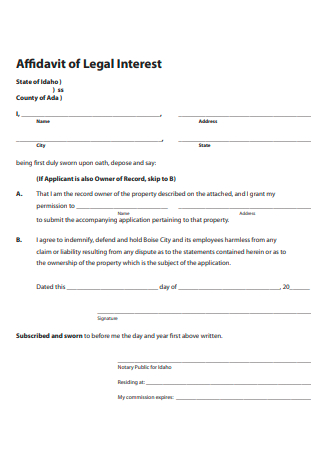
Legal Interest Affidavit
download now -
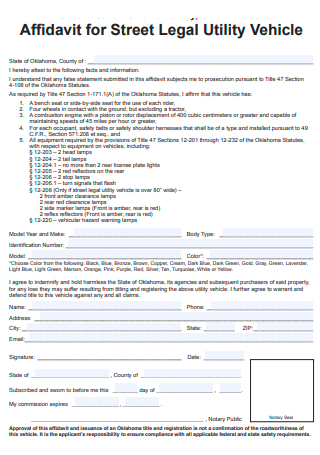
Street Legal Utility Vehicle Affidavit
download now -
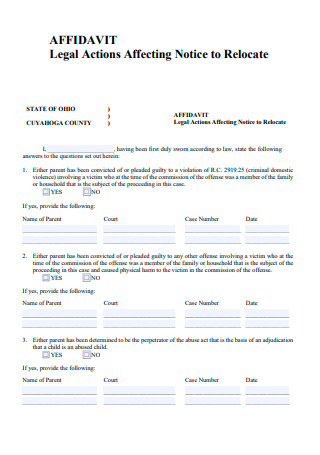
Legal Actions Affecting Notice to Relocate Affidavit
download now -
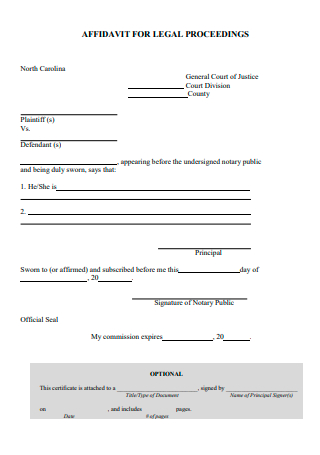
Legal Proceedings Affidavit
download now -
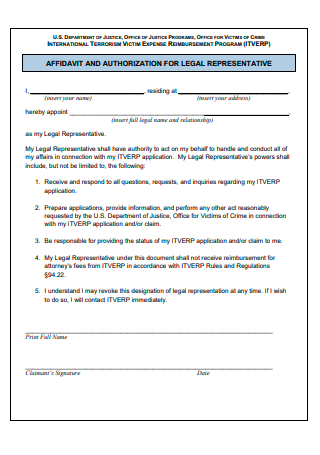
Legal Representative Affidavit and Authorization
download now -
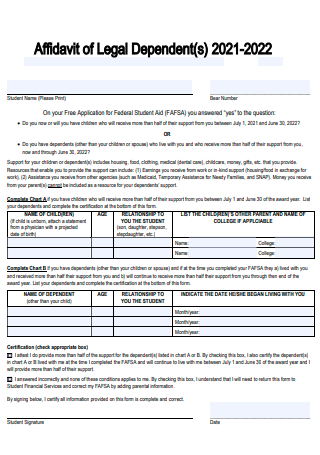
Legal Dependent Affidavit
download now -
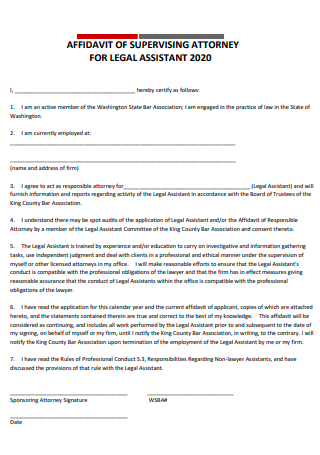
Legal Assistant Affidavit
download now -
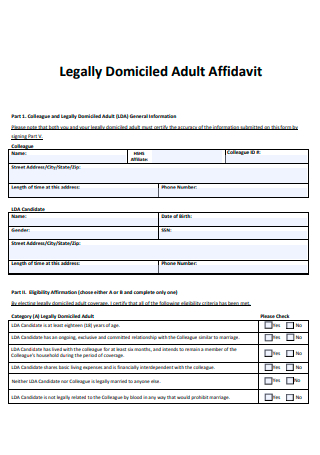
Legally Domiciled Adult Affidavit
download now -
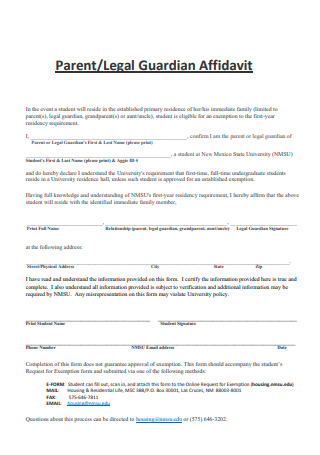
Legal Guardian Affidavit
download now -
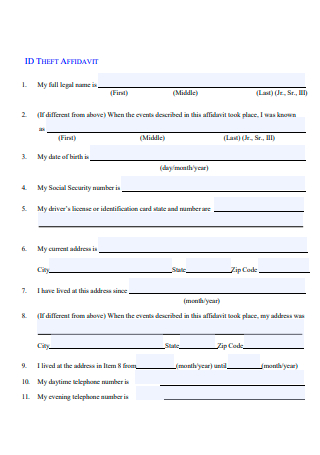
Legal Theft Affidavit
download now -
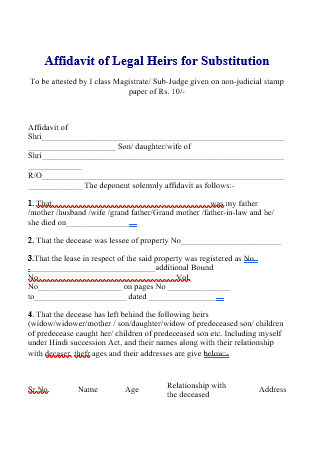
Legal Heirs For Substitution Affidavit
download now -
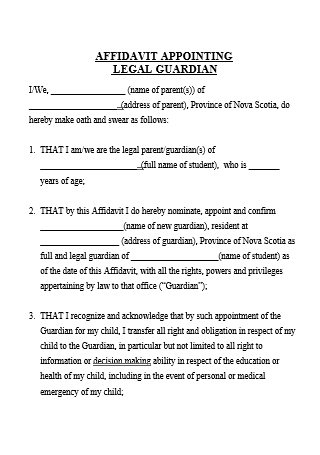
Appointing Legal Guardian Affidavit
download now
What Is a Legal Affidavit?
A legal affidavit goes by many names, including sworn statements, notarized statements, and statements under oath. An affidavit is a legal document that contains a written statement that shares similarities to swearing under oath, similar to a witness standing in a courtroom. The document contains the signature of the person making the statement, known as the affiant, and an individual that has the legal authority and jurisdiction to administer the oath, such as a notary public, certain court officials, or government representatives. An affiant is subject to criminal liabilities, including perjury, if they effectively sign a legal affidavit that contains falsified information. Therefore, the affiant must read the contents of the affidavit thoroughly and carefully to ensure that all the information in the document is accurate and factual. If there is an instance that an affidavit also contains statements that are personal opinions or beliefs of the affiant, there must be an explicit indication that these sentences are as such. However, a legal affidavit must be free from personal opinions or beliefs as it can affect the integrity of the document. Remember that the validity of an affidavit relies on the affiant voluntarily writing the document without any force or coercion. Aside from affidavits providing significant information about a case that help judges to make a sound decision, they are also valuable for record-keeping purposes.
According to the information coming from the website of the United States courts, as of March 2020, in the United States Court of Appeals, the filing of cases increased by 5 percent. Civil cases grew by as much as 16 percent, while filings for criminal defendants grew to 3 percent.
Components of a Legal Affidavit
Affidavits are, more often than not, legal documents that individuals use as evidence to aid their cases during court hearings and other legal matters. Affiants write affidavits as sworn and written statements to a scenario that is crucial to proving a person guilty or not guilty, depending on the accusations. There are different components of an affidavit that the courts find the most effective when an affiant writes them and delivers them during a courtroom meeting or trial. The section below covers the various elements in a legal affidavit with description to help the reader gain a better understanding, writing them with finesse.
How To Prepare a Legal Affidavit
Since legal affidavits are legal documents and are essential to the entire litigation process, their contents must be accurate and articulate. The most crucial thing to remember when writing a legal affidavit is to guarantee that its contents are precise, with the writer paying close attention to the necessary details. All legal documents are comprehensive, bear no grammatical and spelling errors, and contain only factual information. Writing the affidavit may seem difficult at first. However, the entire process consists of easy steps. The section below covers the step-by-step procedure on how to prepare a legal affidavit.
-
1. Understand the Format of the Affidavit and Organize Thoughts and Ideas
When writing an affidavit, there are several formatting rules and regulations that affiants must follow. The document has several sections with accompanying paragraph numbers. Make sure that the statements and paragraphs the affiant writes are comprehensible, concise, and clear. It is best to write them as short as possible, avoiding prolonging sentences and inserting unnecessary commentary. Take some time to construct the document by organizing your thoughts as an affiant to ensure that all necessary information transpires in the affidavit. Start with a detailed outline of the information you wish to include, and ensure that there is no significant detail left behind. Make sure that the statements are descriptive and informative as possible.
-
2. Title the Affidavit
When creating the title of the affidavit, remember to keep it simplistic. Summarize the information that you have about the affidavit you are writing in more or less ten words, including the name of the affiant. For example, if the affidavit covers financial matters, write the title as the Financial Affidavit, then add your name to complete the title. Make it as concise and as simple as possible.
-
3. Develop the Statement of Identity for the Affiant
The statement of identity is a sentence that identifies the essential information of the affiant. The next step in the writing process is to develop a statement of identity that includes details like the name of the affiant, age, job description, and current place of residence.
-
4. Affirm the Honesty of the Affiant Regarding the Sworn Statements
The next step after developing the statement of identity is to certify that all the statements the affiant writes in the affidavit are true and accurate, according to their knowledge. The affiant must affirm the facts as the affidavit is a legal document. There must be a sentence in the affidavit that affirms this. In most cases, the sentence looks like this. “I, name of the affiant, swear that the information in this affidavit is true and accurate to the best of my knowledge.”
-
5. Recount the Facts Related to the Case
Indicate the facts that you wish to communicate to the judge, jury, and all the people present in the court hearing. Make sure that the section contains all the necessary information possible, taking up as much space as you can utilize. There is no length limit or requirement when writing facts and sentences about the case. Utilize short sentences to keep sections at a minimum. Make sure to indicate proper nouns as such, and use as few words as possible to get points across.
-
6. Review, Revise, Sign, and Notarize the Document
All affidavits must be free from grammatical and spelling errors. There must also be no presence of slang or offensive or negative language in the statements. Make sure to proofread the document, ensuring that the statements are clear and effective. Revise the document as necessary to suit the standards of legal documentation. After correcting the affidavit, the next step is to legalize the document. You do this by signing the document in the presence of an attorney or a notary public, serving as a witness that attests that you wrote the statements of your free will without any outside force to influence your actions.
FAQs
What is the principal purpose of an affidavit?
The purpose of an affidavit is to verify the legitimacy of a claim or to accompany witness statements regarding related pieces of evidence in a dispute or any court hearings.
Are affidavits considered as evidence?
Affidavits are admissible evidence. However, there are instances when the court calls on the affiant to participate in a court trial as a witness.
Who can provide affidavits?
Affiants or deponents refer to the individuals that file an affidavit as accompanying documents to a court trial. Any person can draft an affidavit.
Writing legal affidavits require individuals to develop clear, concise, and informative statements that aid the judge and jury to make decisions. A person writing an affidavit, whether it is the first time composing one or not, requires a legal advisor to accompany them when writing statements. For an affidavit to become legal, the individual writing the affidavit, together with court staff or notary public to testify and witness the signing, must be present. Compose a legal affidavit with ease by reading through the article above and downloading from the selection of 12+ SAMPLE Legal Affidavit in PDF | MS Word from Sample.net.
